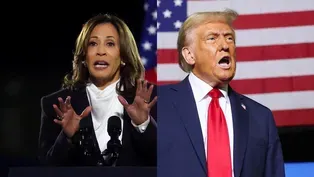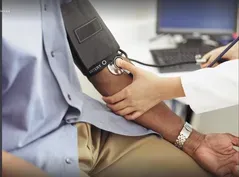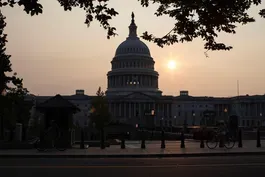
How a college degree is one of the best voter predictors
Clip: 10/30/2024 | 10m 3sVideo has Closed Captions
How a college degree is one of the best predictors of which candidate voters support
American politics are divided in many ways, including based on their education background. To explore this so-called diploma divide, Judy Woodruff visited two neighboring, but very different, counties in Michigan where both candidates have repeatedly made their case as this year’s campaign nears the end. It's part of her series, America at a Crossroads.
Problems with Closed Captions? Closed Captioning Feedback
Problems with Closed Captions? Closed Captioning Feedback
Major corporate funding for the PBS News Hour is provided by BDO, BNSF, Consumer Cellular, American Cruise Lines, and Raymond James. Funding for the PBS NewsHour Weekend is provided by...

How a college degree is one of the best voter predictors
Clip: 10/30/2024 | 10m 3sVideo has Closed Captions
American politics are divided in many ways, including based on their education background. To explore this so-called diploma divide, Judy Woodruff visited two neighboring, but very different, counties in Michigan where both candidates have repeatedly made their case as this year’s campaign nears the end. It's part of her series, America at a Crossroads.
Problems with Closed Captions? Closed Captioning Feedback
How to Watch PBS News Hour
PBS News Hour is available to stream on pbs.org and the free PBS App, available on iPhone, Apple TV, Android TV, Android smartphones, Amazon Fire TV, Amazon Fire Tablet, Roku, Samsung Smart TV, and Vizio.
Providing Support for PBS.org
Learn Moreabout PBS online sponsorshipGEOFF BENNETT: Americans are divided in many ways, including based on their education backgrounds.
That's especially true in this presidential election.
A recent PBS News/NPR/Marist poll found that Donald Trump is leading among voters without a college degree by 10 percentage points.
Kamala Harris is leading with college graduates by 21 points.
To explore this so-called diploma divide, Judy Woodruff visited two neighboring, but very different counties in Michigan, where both candidates have repeatedly made their case as this year's campaign nears the end.
It's part of her ongoing series America at a Crossroads.
DIANE DOYLE SMITH, Democratic Voter: Do you still consider yourself a Democrat?
WOMAN: I do now.
(LAUGHTER) DIANE DOYLE SMITH: Oh, good.
JUDY WOODRUFF: Diane Doyle Smith has spent much of this campaign season canvassing door-to-door to try to boost the Democratic turnout near her home in Novi, Michigan, less than 30 miles northwest of downtown Detroit.
DIANE DOYLE SMITH: I was a Republican for many, many years.
I never voted for Clinton or Obama.
JUDY WOODRUFF: Despite her voting record and the fact that she lives in Oakland County, a once reliably Republican stronghold, Smith is now the vice chair of her local Democrats club.
DIANE DOYLE SMITH: When Donald Trump got the nomination in 2015, I did not want him to be our candidate.
After he won, I cried for, gosh, probably two days and then I looked online for our local Democratic club and I went to the next meeting.
JUDY WOODRUFF: When you realize he was running again for president, what was your thinking?
DIANE DOYLE SMITH: Shock, dismay, disbelief that they would choose him.
I still cannot get over it, especially after January 6.
JUDY WOODRUFF: Smith, now retired, worked in sales and studied criminology in college, but a short drive away, just across the county line in Macomb County, political momentum has shifted in the opposite direction.
A small group supporting Auto Workers for Trump gathered outside the Stellantis assembly plant in Sterling Heights.
AUSTIN IONETZ, Republican Voter: Gave us tax cuts, gave us prison reform.
People were just -- it was all better all around.
Inflation was at an all-time low.
JUDY WOODRUFF: Chris Vitale works for Stellantis and is a member of Auto Workers for Trump.
He was born and raised in this historically blue county and still lives there with his wife and three children.
CHRIS VITALE, Republican Voter: I feel more like the Democrat Party has left me, not that I have left them.
JUDY WOODRUFF: He points to policies that he says have hurt the auto industry.
Michigan has lost more than a third of those jobs since 1990, in part because of trade policies like NAFTA, increasing automation, and companies moving factories to non-unionized plants in the South and overseas.
CHRIS VITALE: They don't realize how much they damage our employers with the regulations and the mandates and the uncompetitive positions that we're forced into.
JUDY WOODRUFF: That message has resonated with Michigan autoworkers, who have historically voted for Democrats.
Macomb County, home to many union and blue-collar workers, has been seen as a political barometer that's flipped Republican at the top of the ticket amid economic downturns.
CHRIS VITALE: Trump becomes a different type of president in the fact that he recognizes the strategic importance of manufacturing.
He sees that this is the greatest way you turn a commodity into something that's got more value, that there's a great importance of manufacturing.
JUDY WOODRUFF: Actually, putting the pandemic and global economic downturn aside, manufacturing jobs under former President Trump and President Biden followed a similar pattern, growth in the first two years in office, followed by losses in the third year.
But there's another reason why these two neighboring counties vote so differently, education.
In Oakland County, where Democrats won decisively in the last two presidential elections, 51 percent of adults have a college degree, while, next door, in Macomb County, it's 27 percent.
And Macomb went decisively for Donald Trump in those same two elections.
It's a phenomenon playing out across the country, a contrast with the class and income divisions that defined political parties for much of the 20th century.
MATT GROSSMANN, Author, "Polarized by Degrees: How the Diploma Divide and the Culture War Transformed American Politics": Well, it's been the biggest change in American politics over the last few decades, as college-educated voters moving toward the Democrats and those without college education moving toward the Republicans.
JUDY WOODRUFF: Matt Grossmann is a professor of political science at Michigan State University and co-author of a new book, "Polarized by Degrees: How the Diploma Divide and the Culture War Transformed American Politics."
MATT GROSSMANN: The college-educated voters used to have a very small proportion of the population, not enough to really make up a voting constituency.
And now they have.
They also dominate our social and cultural institutions.
They dominate the media, academia, nonprofit world, and even the corporate world.
And it's reflected not just in voting, but in pretty much everything we see around us in the culture war kind of inflaming our society.
JUDY WOODRUFF: The number of Americans with four-year college degrees has increased dramatically.
In 1960, less than 8 percent of American adults held college degrees.
By the last couple of years, that had grown to over 37 percent.
But whom their voting for has changed.
MATT GROSSMANN: College-educated voters used to be more likely to vote Republican, but it wasn't education.
It was really income that was driving that relationship.
Instead of having the rich vote Republican and the poor vote Democratic, what you have is the more educated voting Democratic and the less educated voting Republican, which means that there's almost no difference based on income anymore.
JUDY WOODRUFF: For Vitale, a third-generation autoworker, there's a good reason that difference exists.
CHRIS VITALE: I think, when you come up in a blue-collar background, there's a lot more wanting to get down to work and get down to your life, and that, when you are a little more removed from, that it's more like, well, let's go up to university and we will have a party for four years on dad's dime.
And I didn't have any interest in that.
And of course, college university systems largely become reeducation centers, where we take these kids that may have grown up with traditional values, and we fill their heads-up full of new ideas that are basically meant to just tear everyone apart.
JUDY WOODRUFF: But a few miles away, in Oakland County, Vital Anne, a mechanical engineer in the auto industry, says her degrees have broadened her perspective.
VITAL ANNE, Democratic Voter: For a long time, I was apolitical.
And then I kind of shifted towards the Democratic side because it felt like it aligned with my values a lot more.
JUDY WOODRUFF: I asked Anne if she thinks her academic background has impacted her views.
VITAL ANNE: The demographic that I work with are very highly educated.
And because they are highly educated, they pay more attention to science and data.
And we also may be a little more affluent, so we can afford to think more about what is the long-term view of this or long-term effect of this, instead of people who are living paycheck to paycheck, and then all they can think about is, why are these groceries costing so much right now?
JUDY WOODRUFF: Matt Grossmann said this new fault line in politics has contributed to increased polarization and resentment of the other side.
MATT GROSSMANN: It's reflected not just in voting, but in pretty much everything we see around us in the culture war kind of inflaming our society.
Republicans have become less trustful of experts.
Republicans and Democrats now disagree about all kinds of cultural, social issues that they didn't used to.
Things that really didn't used to be about politics are now about politics.
We're experiencing it in our everyday lives.
You can see the signals of people on the left or the right in far more places than you used to.
JUDY WOODRUFF: Which is happening faster, that Democrats are gaining among higher educated voters, or that they're losing among voters with less education?
MATT GROSSMANN: They're gaining lately at a faster clip among college-educated voters than they're losing among white voters without a college degree.
But the declines among white voters without a college degree are much more longstanding.
Some of them date from the 1970s onwards.
So that's a trend that has been more longstanding, but is currently slower than the trend on the other side.
The trend we're looking for in this election is, do those education divides extend to minority voters?
Minority voters have not divided along educational lines anywhere near the level that white voters have, and they maintain a stronger attachment to the Democratic Party.
If that breaks and they start to divide along educational lines like white voters have, that would be good for the Republican Party's electoral change.
JUDY WOODRUFF: One more division in an already polarized America.
And this one could be the deciding factor in next week's presidential election.
For the "PBS News Hour," I'm Judy Woodruff in Macomb County and Oakland County, Michigan.
Americans in Ukraine on how election could change war
Video has Closed Captions
American volunteers fighting in Ukraine share views on how election could affect the war (7m 8s)
Harris, Trump campaign in N.C. with less than a week to go
Video has Closed Captions
Harris and Trump swing through North Carolina with less than a week of campaigning left (5m 8s)
A look at Harris’ and Trump’s positions on healthcare policy
Video has Closed Captions
A look at Harris’ and Trump’s positions on healthcare policy (6m 40s)
New airline refund rules could ease travel hassles
Video has Closed Captions
New airline refund rules could ease travel hassles for American passengers (4m 32s)
'Purpletown' documents what people still have in common
Video has Closed Captions
'Purpletown' documents what people in politically divided areas still have in common (4m 51s)
Races that will determine the balance of power in Congress
Video has Closed Captions
Pivotal races that will determine the balance of power in Congress (6m 6s)
Providing Support for PBS.org
Learn Moreabout PBS online sponsorshipMajor corporate funding for the PBS News Hour is provided by BDO, BNSF, Consumer Cellular, American Cruise Lines, and Raymond James. Funding for the PBS NewsHour Weekend is provided by...

















